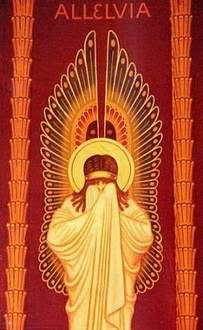Because the papers that I would write were limited to only five pages for each question, I had some concern about writing a cohesive five-page essay on Question #2. I was able to communicate with my board through the academic advisor to receive clarification on what was expected for Question #2. The board allowed me to write two shorter essays (2.5 pages each) to address each part of Question #2.
Major Area: Liturgy
Question #1
“Christianity is lived under the regime of memorial, not of anniversary or mime” (Chauvet, The Sacraments: The Word of God at the Mercy of the Body, 158). In every Christian celebration, what is memorialized is the saving work of God through the mystery of Christ’s death and resurrection, a past event made present and effective today by the Holy Spirit. Yet this memorial is not an intellectual exercise or a dramatic re-enactment; it is symbolic in the deepest sense of the word. Describe how our participation in the sacramental symbols is anamnetic, epicletic, and proleptic. Portray the dangers resulting from allegorical or dramatic understanding of liturgical symbols. Relate the ninth- and eleventh-century Eucharistic controversies to various ways of understanding liturgical symbols.
Question #2
Part One: In your topics, one reads that “[i]n the Incarnation, the Divine Word was joined to the matter of human life.” The Gospel of John reveals that “[i]n the beginning was the Word” (1:1), and the First Letter of John reveals, “concerning the word of life,” that “we have heard,… seen with our eyes,… looked upon and touched with our hands” (1:1-2).
- Is the incarnation a past event? That is, did the incarnation end with the death of Jesus of Nazareth?
- In Trinitarian terms, what of the gift of the incarnation in that sacramentum Dei that “says,” “brings,” and “announces” (Vorgrimler) today?
- In liturgical experience, what is the link between the life of the historical Jesus of Nazareth and the lives of those assembled for the sacraments?
Part Two: One reads in the same topic that “all the words we use in liturgy bear a symbolic weight.” Consider the following phrases of a Sunday Mass:
[Cantor] Please stand. Our opening hymn is on page 273.
[Deacon] A reading from the holy Gospel according to Mark.
[Priest] Lord, wash away my iniquity; cleanse me from my sin.
[Priest] This is my body which will be given up for you.
[Eucharistic Minister] The blood of Christ.
[Assembly] Our Father, who art in heaven.
[Assembly] Thanks be to God.
- Do these “words we use in liturgy” — for example, “on,” “book,” “Gospel,” “the,” “to,” “Lord,” “from,” “body,” “you” — bear the same symbolic weight? Why (or why not)?
- How do the baptized and the baptized-and-ordained come to know the value of words in the liturgy?
- Based on your reading and experience, what general sacramental principle(s) about words and symbols of the liturgy can be drawn from what you write?
Minor Area: Systematics
Question #3
“When God’s word and God’s glory (shekinah) are present to human beings, they do not represent’ an absent God; instead, they present the manner in which God is most intimately present within the human person” (Vorgrimler, Sacramental Theology, 7). This intimate presence can simply be called “grace.” Yet the language of grace and how the Church understands God’s intimate relationship with humanity has changed throughout the years. Summarize the major understandings of grace that have shaped the Christian tradition, specifically those of Augustine, Aquinas, Luther, and Rahner. What are the major similarities and difference among them? Drawing particularly on the work of Gula and Mahoney explain the implications of these various conceptions of grace on the Church’s moral teaching and understanding of a faithful moral life.

No comments:
Post a Comment